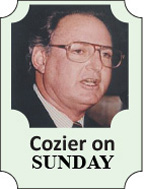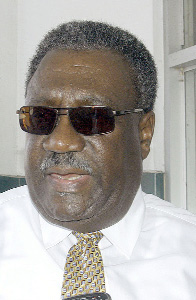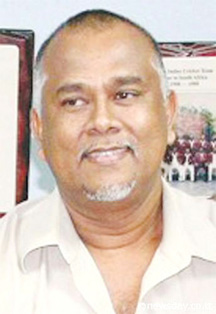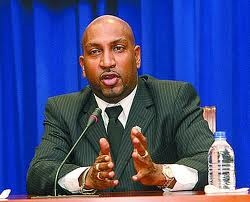The US$62,500 winners’ pay day in the current Caribbean Twenty20 – even the overall pot of US$125,000 – is mere pocket change to the real megabucks of the Indian Premier League (IPL), Australia’s Big Bash and other such biff-bang extravaganzas that have sprung up in every country since introduced in England in 2004.
There is an obvious reason. The West Indies Cricket Board (WICB) is clearly under singular financial constraints, caused mainly by small island populations and economies but also by the hefty cheques arbitrators keep ordering them to sign over to the West Indies Players Association (WIPA).

The winners qualify for the multi-national Champions League in India (US$2.5 million for the top team, US$1.3 million to the runners-up, US$500,000 to the semi-finalists, US$200,000 for simply making it). And the West Indies squad for the fourth ICC World T20 in Sri Lanka in September, to be chosen strictly from the regional teams in the Caribbean T20, will share in the total prize payout of US$20 million (US$5 million for the champions).
Then there is the exposure provided by such high-profile, globally televised events.
Kieron Pollard, for one, shot from ball-beater scarcely known outside the Caribbean to a T20 superstar on the evidence of his six-hitting for Trinidad and Tobago in the first Champions Trophy in India in 2010. It is a reputation regularly embellished since, most recently with his five mighty sixes in an over off the Leewards’ usually miserly Anthony Martin in Antigua on Wednesday night.

Still, for all its popularity – or, more accurately, because of it – administrators remain nonplussed over where to place T20 in the scheme of things.
There is a prevalent view that it is undermining Test cricket, the traditional bedrock of the game, and should be carefully handled. At present, the ICC limits such matches to a maximum of two a series yet still stages a World tournament every two years.
When the now dishonoured and incarcerated Allen Stanford pumped his allegedly ill-gotten millions into starting the first Caribbean tournament, Chetram Singh, recently retired head of the fractured Guyana Cricket Board (GCB), spoke of the harmful potential of money and greed. In addition, he claimed that all the young Guyanese batsmen wanted to do was to perfect their swiping to earn themselves some of Stanford’s dough.
It was an interpretation shared by many but not by the wide-ranging Patterson Report to the WICB.
The West Indies, it asserted, “should be to the forefront of change and the adaptation to change.

“We must not be left stumbling behind as new tactics are developed and traditional skills take more of a back seat,” the committee, headed by the former Jamaica prime minister, wrote. “Different coaching, training, practice and preparation (methods) will be necessary. New criteria for selection will be required.”
Whether the West Indies have been “left stumbling behind” is open to question.
By more than holding its own in two Champion League appearances against opposition from the IPL, the Big Bash and leagues from other countries, Trinidad and Tobago proved that they were in tune with Patterson’s dictum.
In contrast, Guyana were embarrassingly outplayed as the Caribbean representatives in 2009 while the West Indies team itself, as it does in the two other formats, languishes near the bottom of the ICC’s T20 standings with a record of 12 wins against 16 losses.
The truth is that there is little evidence of coaching, practice and preparation methods specifically for the new format. And if new criteria have been applied to selection it does not involve consistency.
The West Indies’ five T20 Internationals last year (against Pakistan, India, England and Bangladesh) featured 25 different players. Only captain Darren Sammy and Marlon Samuels played in all.
After the present tournament, the selectors should have a settled squad in mind and stick to it in the five such matches (two against Australia, one against England, two against New Zealand) leading up to the World T20 in Sri Lanka.

The WICB also needs to reassess the structure of its regional tournament.
It took over the regional T20 from Stanford, throwing in a dash of international flavor with county and ICC associate teams invited.
The overseas guests have done nothing to lift standards. Although Hampshire reached the 2011 final, they and the other counties (Somerset last year, Sussex this) have been invariably well below full strength with their best players either on national duty or else turning out for one of the lucrative franchises scattered around the cricket map.
For their part, Canada and now the Netherlands have come directly out of winter with virtually no preparation. The Dutch have been further weakened as their two best players, Ryan ten Doeschate and Tom Cooper, have given the Caribbean a miss; Canada are minus their long-standing captain Ashish Bagai. Neither has been competitive.
In future, it would be more productive to keep the tournament strictly West Indian, with teams playing the other on a round-robin basis leading to semi-final and final.
It would generate inter-territorial intensity and guarantee no walk-over matches.
Last year, for instance, Barbados played neither Jamaica nor Guyana. The only way they, and Jamaica, can take on Trinidad and Tobago or Guyana this time is in the semi-final or final.
These are age-old rivalries that should not be abandoned.
This week’s update on the continuing disintegration of West Indies cricket:
Guyana: The impasse between the government’s Interim Management Committee (IMC), the Guyana Cricket Board (GCB) and the West Indies Cricket Board (WICB) gets messier.
The government denies it has reached a consensus with the WICB over the future roles of the IMC and the GCB and says mediation talks before the Caricom Secretary General are “yet to be concluded”. It terms the leak of a document from the meeting “particularly deplorable” and a “breach of confidence (that) does not augur well for bringing the discussions to a mutually agreeable conclusion”.
Clive Lloyd warns the GCB it is “messing with the wrong person” in its attempt to have government rescind his appointment as IMC head.
Trinidad and Tobago: Sports Minister Anil Roberts demands a public apology from Trinidad and Tobago Cricket Board (TTCB) president Azim Bassarath for “selling out” Kieron Pollard and Dwayne Bravo to their Indian Premier League (IPL) franchises in last year’s Champions League. None is forthcoming and the TTCB sticks by its chief.
Antigua: Sports Minister Winston Williams charges that cricket is being “stagnated” by the cricket association’s apparent lack of commitment and strongly hints at government intervention. It is reported that the association, under WICB director Enoch Lewis, hasn’t held an annual general meeting for five years.





